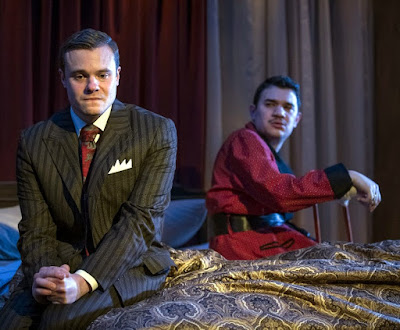Ballet Review
Midsummer Night's Dream
Joffrey Ballet
Auditorium Theatre, Chicago
Thru May 6
@@1/2
Certainly the undertaking--including new music composed by Ekman's frequent collaborator, Mikael Karlsson--is immense and impressive.
Midsummer Night's Dream
Joffrey Ballet
Auditorium Theatre, Chicago
Thru May 6
@@1/2
My life is an ongoing quest to be entertained, enlightened and occasionally dazzled.
And this long-running blog--now prominent and well-regarded enough to bring me many gracious Press Night invitations--provides an outlet to passionately tell you when I am.
And just as candidly, when I am not.
As in this case, about a new ballet by the esteemed Joffrey, called Midsummer Night's Dream (with no direct connection to the Shakespeare of the same name).
While my disappointment was echoed by everyone who--many far more vociferously--voiced an opinion on the train platform post-show, I hope that you disagree with me.
And if you are inclined to attend ballets, including rather new and non-traditional ones, it likely behooves you to check out what Swedish choreographer Alexander Ekman has put together, with no regard for what a rube like me might think.
 |
| Photo credit on all: Cheryl Mann |
I am certainly not a ballet expert and will take it on faith that the numerous Joffrey ensemble members onstage danced wonderfully. But for me, there really were no "Oh, wow!" moments, even in terms in terms of demonstrable balletic artistry.
And with all the caveats you may want--that Ekman's concept was unfolding within a dream and thus intentionally quite surreal, that I often have problems with highly interpretative, non-linear art, that almost anything now considered brilliantly original probably met with scathing initial disdain--I really had no clue what was going on.
Through intermission, watching the performers first dance around in hay and later seemingly gather to extol a prophet on a beach, interlaced by a Swedish vocalist named Anna von Hausswolff channeling Kate Bush--with appealing but largely indecipherable songs--I was willing to see this Midsummer Night's Dream as something quite creative-but-different, if not personally moving.
But Act II took the surrealism to far more heightened levels of oddity, confusion and--to this viewer--seeming self-indulgence.
Beds floated, tables levitated, huge fish heads appeared, making for quite the acid trip and/or dream, yet I was sober and awake.
Late in the show, the entire gaggle of dancers sashayed around in their skivvies. With all the lithe, sculpted bodies--of both sexes--I can't say this was an unpleasant sight, but given my utter lack of comprehension or embrace, it almost felt exploitive.
To be clear and fair, Ekman seems to be quite esteemed and--appreciative of his ambition--I'm not accusing him of anything except creating a newfangled ballet that left me cold.
But while understanding that ballet dancing is often a scantily-attired profession, I couldn't tell you why everyone wound up prancing around in near nakedness.
No harm, no foul, and full respect to all involved.
Yet despite usually beguiling ingredients--enjoyable music, good singing, wonderful dancing, interesting scenery, attractive people--on a still chilly spring night in Chicago, this Midsummer Night's entertainment just wasn't a Dream come true.


















































